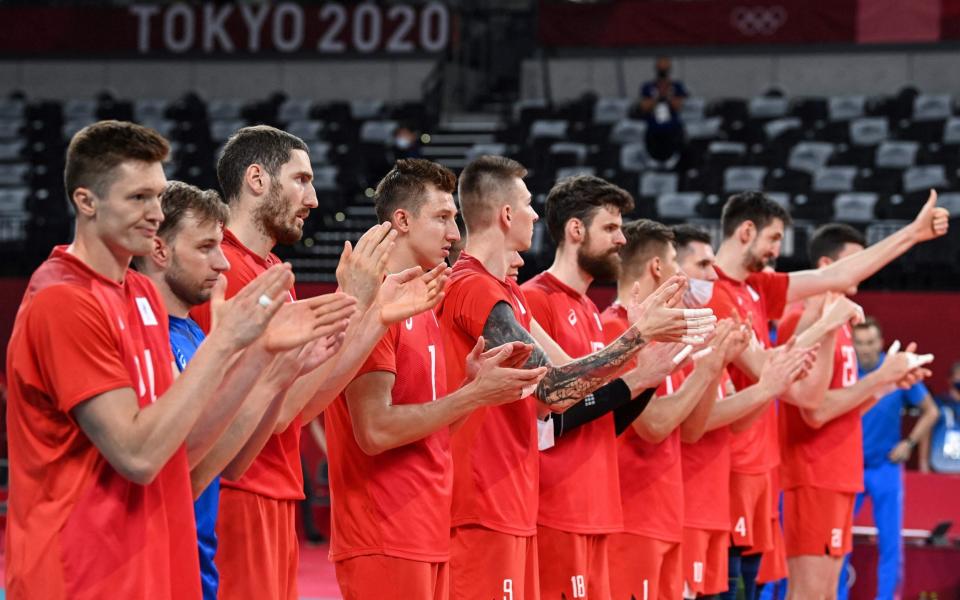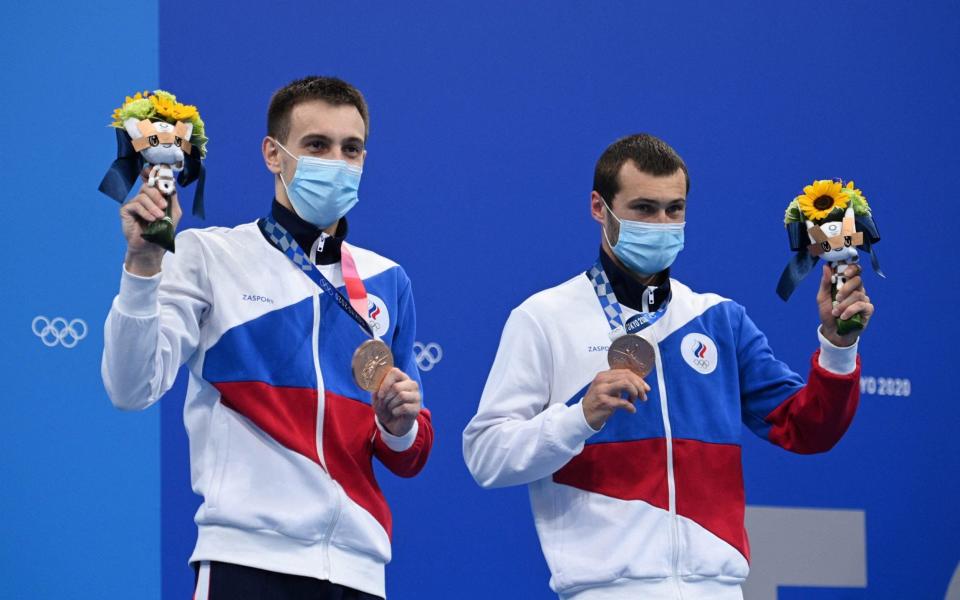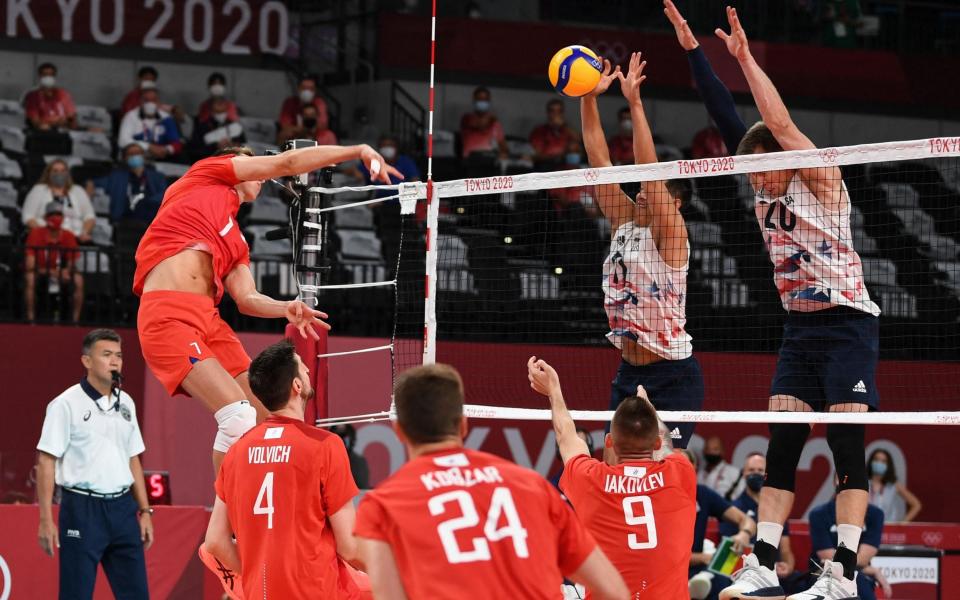Why Russia is competing at the Tokyo 2020 Olympics as ROC and how it makes a mockery of Wada's doping ban

They play for teams like Zenit Saint Petersburg, Ural Ufa, and Gazprom-Ugra Surgut. Their journeys to Tokyo’s Ariake Arena began in Pyatigorsk, Moscow and Chelyabinsk. The emblem on their chest shows white red and blue in that order, matching the flag of the world’s largest country. Yes, the Russians are coming. But you can’t call them that.
Their volleyball team seem to be a likeable bunch. Determined, skilful and scrappy, some of the most strapping young lads at this Olympics. But why are they here at all?
In 2019 the World Anti-Doping Agency (Wada) banned Russia from all international sport for four years. Russian athletes not implicated in doping would still be allowed to compete as neutrals. Strictly speaking then, Russia aren’t here. You didn’t see them. Yet they have more athletes in Tokyo than they did in Rio five years ago. Some ban.
It is hard to imagine a bigger violation of sporting fairness than the contents of Wada’s McLaren Report on Russian doping. It alleged not only systemic cheating but state involvement, and a failed attempt at a cover-up. Forty three Olympic medals have been stripped from Russian athletes as a result, with the Wada ruling prohibiting use of the name “Russia” at this Olympics, the use of its flag, and its national anthem when gold medals are inevitably won.
Last year that four-year ban was halved by the Court of Arbitration for Sport. While the flag and anthem remain absent (gold medallists will hear Tchaikovsky’s Piano Concerto No. 1 instead) the limits of the punishment are being tested visually.
The volleyball uniform is less provocative than the team polo shirts spotted on officials wandering around Tokyo’s venues. Each has a diagonal but unmistakable Russian flag smeared over the front. A line was crossed by the artistic swimming team, though. They have been refused permission to wear a costume featuring a drawing of a bear.

Martin Dubbey, now managing director of investigations firm Harod, was Wada’s chief investigator into Russian doping. He is surprised how accommodating the International Olympic Committee has been. “How weak and bending over backwards can the IOC get?
“I mean let's face it, it's not a little flash [of colour on the uniform] is it? It's just like the whole uniform is Russia. Where's that neutral colour?”
Dubbey says Russian doping constitutes a “‘massive fraud on the rest of the world”.
“It not only impacts on innocent athletes but embarrasses the whole institution of the Olympics. You get a slap on the wrist, get punished but then you're able to weasel your way out of the punishment. It doesn't seem right.
“To me it's an insult to the athletes that have toiled hard and tried to compete against doped athletes. When those doped athletes dope with the connivance of the state, it makes it even worse. Russia is not the only one, but they have been caught out spectacularly at this on a grand scale. And what's been the punishment?”
The compromise at this Games is all in the name. Russian athletes are competing as the ROC, standing for the Russian Olympic Committee and stirring Euro 92 memories of the post-Soviet CIS. While it is clear what it stands for, ROC are supposed to be referred to in acronym form only, so are technically conforming with the rule that forbids use of the word “Russia”. Attritional chipping away at the edges of fairness has been in the Russian playbook for some time, says Dubbey.
"It's not just about having cheated in the first place. It's the kicking and screaming afterwards and tying up an enormous amount of Wada time and effort that could have been spent on genuine work helping athletes.
“I've seen the lengths we've had to go to, to prove the forensics on their cases. The Russians battled the credibility of every single email, but we won every time.”
It was not hard to identify the sides during Monday’s Pool B volleyball game. One wore white and the stars and stripes. Their opponents had names printed on their back, among them Panklov, Volkov and Kurkaev.

Volleyball poses the same question at every summer Olympics: Why aren’t we watching this all the time?. It is a full-throttle sport of careful plans ruined, double-bluffing strategies, improvisation and improbable athleticism. It should be bigger than football. Perhaps that’s unrealistic, but certainly rugby.
Six players per side solve terrible problems at speed with delicate interplay and movement. One false move and the world ends. Mutually assured destruction.
In an exceptionally tight first set on Monday the USA and ROC teams matched each other all the way before Egor Kliuka (6’10”, beard of a craft beer connoisseur) battered the winner over the net, putting his team on the required 25 points by a margin of two.
America pulled ahead in the second set but lost their nerve, were pegged back and edged out 27-25. The signs seemed ominous but they rallied to take the third set.
The game had the competitiveness of a final but respectful applause between the sides at times suggested the match-up lacked the intensity of some of the Cold War classics - The Miracle on Ice at the 1980 Winter Olympics, the Soviets boycotting the 84 summer games in LA, then a year later the big one: Rocky vs Ivan Drago.
But any meeting between these countries has resonance, whatever the sport. In volleyball this was the third and fourth top-ranked men’s sides in the world, both with eyes on a medal. The five most recent games between the two have been won by one, then the other. After a miscue at the net which cost his team a point American Torey Defalco looked ready to murder his own pet.
It is not hard to see why IOC are minded towards leniency to Russia. Theirs would be a lucrative set of TV rights to lose if all athletes were banned. The USA and Russia (combined with the Soviet Union) are a distant top two in the all-time Olympic medal table. Clashes between the two are irresistible.
"When it comes to Russia, there seems to be a completely different way of handling things,” says Dubbey. “And there's no doubt, Russia has a massive lobbying capability over IOC. So, what do you expect?”
To repeat his question: What is exactly is their punishment for one of the most grave sporting transgressions imaginable? Winning Russian athletes will have to hear a different piece of music than they might have imagined in their visualisation sessions, but the victorious ice hockey team at Pyeongchang in 2018 circumnavigated a similar ban by simply breaking into the song during the medal ceremony.
Two weeks ago swimmers Alexandr Kudashev and Veronika Andrusenko were provisionally suspended for anti-doping violations, so disqualified from competing in Tokyo as planned. The Russian Rowing Federation left out Nikita Morgachev and Pavel Sorin from the ROC Olympics squad after both tested positive for banned substance meldonium.
Despite apparent ongoing issues with doping there is unlikely to be another large-scale revelation from the country, says Dubbey. "This only came to light because Grigory Rodchenkov defected, if he hadn't defected and kept his mouth shut, we wouldn't have been having this conversation.
“I do not think we'll see another whistleblower out of Russia like Rodchenkov. When they see the weakness of the punishment why would they anyway? There is nothing to encourage them.”
Back in the Ariake Arena the ROC had pegged back America again in the fourth set. With every point marked by roars, whether it was won by a moment of genius or an opponent’s error, both teams were tiring. Once again the ROC clinched a tight set, and the match. With victory secured, Russia in all but name march on.

 Yahoo Sport
Yahoo Sport 





































